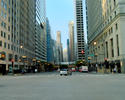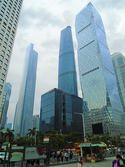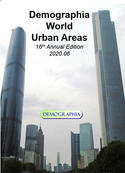Xi’an (pronunciation) is located in central China, on the Wei River, a tributary of the flood-prone Yellow River (Huang He). Xi’an is at the bottom of the “Ordos Loop” (see Surprising Ordos: The Evolving Urban Form), which is formed by the Yellow River’s sharp northward turn upstream at Lanzhou, toward Inner Mongolia (Nei Mongol). read more »
Geography
Xi'an: Ancient and Modern: The Evolving Urban Form
- Login to post comments
Are Great Lakes a Big Economic Advantage?
Denizens of the Great Lakes watershed long have looked at those five vast, deep, shimmering pools not only as an unmatched economic and cultural resource but also as the ultimate trump card. read more »
- Login to post comments
'The Hamptons' is a One-Industry Place
A “resort” community where there is no central commercial resort can still be a one-industry economy. In the case of the South Fork of Long Island (aka “Hamptons”), the one trick is luxury housing. There’s an extensive commercial/labor ecosystem to support it. read more »
- Login to post comments
The Trans-Andean Highway: Most Incredible Mountain Pass in the World?
The Andes are the longest mountain range in the world, stretching 4,300 miles (7,000 kilometers) from near Lake Maracaibo in Venezuela, not far from the isthmus of Panama that connects South American to North America to Tierra del Fuego, near the Straits of Magellan, less than 700 miles (1,100 kilometers) from the Antarctic Peninsula. By comparison, the Andes stretch almost half again the distance of the Rocky Mountains and more than 2.5 times that of the Himalayas. read more »
- Login to post comments
After Election, We'll Still Be 'Forgotten Man'
Regardless of your politics, you have to agree that Donald Trump remembered the “forgotten man” and woman. Yet that particular class of American still seems forgotten, frankly – or deliberately overlooked. And that doesn’t bode well for Flyover Country no matter what happened in the election. read more »
- Login to post comments
Two Decades of Interstate Migration
America is still a mobile nation. Back in the 2000-2010 decade, 12.9 million people moved interstate, nearly five percent of the total population. In the 2010s the population has been a bit less mobile, with net domestic migration of 11.7 million residents, slightly under four percent. Nonetheless, 11.7 million is a large number. This is nearly equal to the population of Ohio, with only five states being larger read more »
- Login to post comments
The Heartland's Revival
For roughly the past half century, the middle swath of America has been widely written off as reactionary, backward, and destined for unceasing decline. read more »
- Login to post comments
Slower Municipality Growth in China: 2010-2019
China, which many see as the exemplar of rapid urban growth, is accelerating its own shift towards greater dispersion.
During the 2000s, the largest municipalities (formerly called prefectures) of China grew very quickly. Much of this was a result of an increasing “floating population,” people who moved to the cities from rural areas for employment, especially in factories producing goods for export and in construction. Between 2000 and 2010, according to the China Statistical Yearbook: 2019, the floating read more »
- Login to post comments
Demographia World Urban Areas, 2020: Tokyo Lead Diminishing
For the first time in more than six decades the world’s second ranked built-up urban area has reached within 10% of leader Tokyo. The 2020 edition of Demographia World Urban Areas reports that Jakarta has reached a population of 34.5 million, behind Tokyo-Yokohama’s 38.0 million (Figure 1). The report can be downloaded here (Note 1). read more »
- Login to post comments
The New Geography of America, Post-Coronavirus
When there is a general change in conditions, it is as if the entire creation had changed, and the whole world altered — Ibn Khaldun, 14th Century Arab historian read more »
- Login to post comments






















